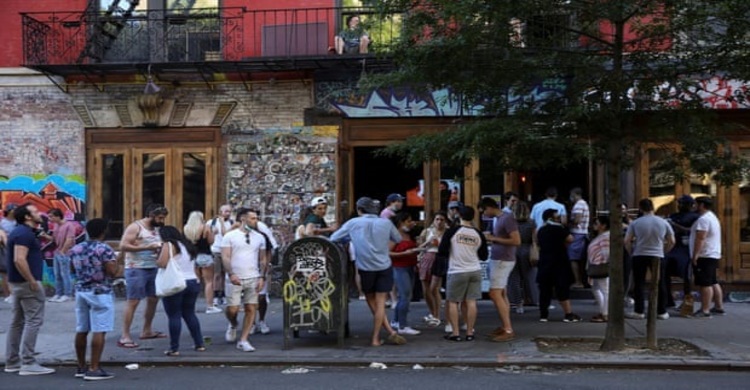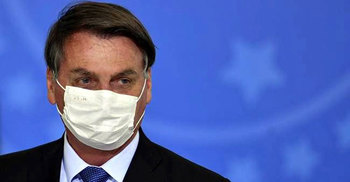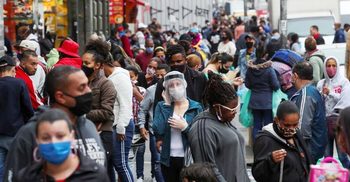Street partying fuels fears of coronavirus resurgence

Motorcycles revved, waiters served drinks and food in busy outdoor street seating areas and, on the pavement, people gathered to sip to-go drinks. Crowds of largely younger people – many not wearing face masks – continued partying long after the bars and restaurants closed, with reports of loud music and fireworks.
On Saturday night in Astoria, in Queens, it was almost as if coronavirus had never hit New York City.
“We were inside for such a long time and people are getting tested. We’re much more comfortable in our skins,” said Adil Mehmood, 33, a teacher from East Elmhurst, queueing for a table at a restaurant in Astoria without a mask.
In April, the city was the center of the global coronavirus pandemic, with the daily death toll reaching almost 800 people at its height. But as cases of Covid-19 have steadied and lockdown restrictions have eased, this stretch of Steinway Street has emerged as an unofficial party street.
With indoor nightlife still banned, other post-pandemic going out hotspots include the Lower East Side in Manhattan and Williamsburg in Brooklyn.
But standing on the other side of the road from Mehmood in Astoria, outside a barber shop, Omar Melendez, 39, who has a newborn at home, said he was “living in fear”.
“It’s chaotic. Everything’s going back to what it was. There’s no social distancing, many people not protecting themselves.”
The heating, ventilation and air conditioning technician from Astoria said he was not going to bars. “I have drinks at my house, it’s safer. I don’t think people know what the word pandemic means.”
New York’s mayor, Bill de Blasio, has branded the situation in Astoria “unacceptable”.
His office said it had suspended one establishment, Brik Astoria, from the city’s open restaurants programme for a week and it will be required to submit a social distancing plan before it can reopen. It said the sherriff’s office, which handed out face masks in Astoria on Saturday night, was patrolling “high-impact areas” on weekends.
The New York governor, Andrew Cuomo, who recently introduced a “three strikes and you’re closed” rule for bars and restaurants that don’t comply, on Monday said gatherings among young people across the state were “getting worse” and threatened to roll back the opening plan and shut all establishments.
Issuing a stern warning to young people, he said: “Don’t be stupid. What they’re doing is stupid and reckless for themselves and for other people. And it has to stop.”
Many bar and restaurant workers do not have a choice as to whether they go to work – even if they are uncomfortable with their employer’s approach to safety.
Anthony Advincula, public affairs officer and national policy coordinator for Restaurant Opportunities Centres United, said: “They need a job right now, but they also need to have good health, so it’s a catch-22.”
He said state and local governments “must hold accountable all employers that continue to put their workers at risk during and after reopening”.
While overall coronavirus cases across southern and western states of the US continue to surge and deaths rise, New York’s positive test rate is stable at about 1%. On Sunday there were 284 new cases in New York City and eight deaths across the state.
But in recent weeks New York City has seen an uptick in new cases among young adults. Between the beginning and end of June, the case rate among 20-to-29-year-olds jumped from 26.63 per 100,000 to 34.64.
Dr Lorna Thorpe, an epidemiology professor and director of the division of epidemiology at NYU Langone Health, said: “The total number of cases remains fairly constant but the proportion that are among young adults has increased.”
Although she said household transmission was probably down, now she believes most cases are either from other states or from socialising, which tends to involve younger people.
While less risky than gathering indoors, Dr Thorpe said people crowding on streets to party is “deeply concerning”.
“We know that there is a lot of transmission of coronavirus around the country and it takes events like this to suddenly have a cluster develop and as more clusters develop, the more difficulty we will have to control them.”
Taking risks on a night out at the weekend can also reduce people’s vigilance in other parts of life, she said.
Taking risks on a night out at the weekend can also reduce people’s vigilance in other parts of life, she said.
“It’s not easy to sustain all of the social distancing behaviours that we have been sustaining, but it is important to sustain as many of them as possible.”
Dr Ashwin Vasan, assistant professor at Columbia University medical center and president and CEO of the mental health charity Fountain House, said that while on an epidemiological level the partying is “not great”, authorities should be looking at the driving factors behind it such as unemployment and the stalling of education.
“You’ve got this mass uncertainty, combined with four or five months with relative isolation and in an environment where, even though in New York City the messages have been pretty clear, in a wider environment, a media environment and a national environment, political environment where these basic public health strategies are being politicised and called into question.”
For many out socialising on the streets of New York, mask-wearing still appears to be an issue.
In the East Village, which before outdoor dining was permitted became a hotspot for street drinking, many of the bars and restaurants have cordoned-off areas. But on Saturday night groups of people still gathered close together on the streets – many unmasked.
Outside the William Barnacle Tavern, Genie Gilmore-Otway said she felt safe working because she is careful, but that she sometimes has to ask people to wear masks when ordering. “They’re young, they think they’re safe or just can’t get it.”
Her husband, tavern owner Lorcan Otway, said he was worried about a second wave of coronavirus. On CCTV he has seen people walking down the street coughing and then sharing drinks.
“When 99% of us are being careful, it’s absolutely destroyed by people flaunting their lack of regard for each other.”
Source: The Guardian







